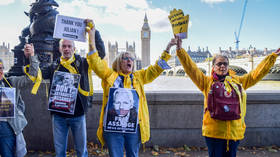Assange supporters surround UK Parliament

Supporters of WikiLeaks co-founder Julian Assange gathered outside the UK Parliament in London on Saturday to protest his impending extradition to the US, where he faces espionage charges that carry a prison sentence of up to 175 years.
Videos posted on social media show hundreds of people, including former UK Labour Party leader Jeremy Corbyn, having formed a human chain that spanned the parliament’s perimeter and wound across the nearby Westminster Bridge to the other side of the Thames River.
The protesters held signs reading ‘Free Assange, No Extradition,’ ‘Journalism is not a crime' and 'Prosecute war crimes, not Assange'.
Stella Assange, the journalist’s wife, also participated in the demonstration. She said that the UK government should communicate with the US authorities to end the extradition request, which was filed in 2019.
Video: Protesters surrounded the UK parliament on Saturday in a historic first, with a show of support for publisher Julian Assange and one clear message: Free Julian Assange! | [video by @jjjj86] #FreeAssangeNOW#SurroundParliamentpic.twitter.com/gRAv7B4scb
— WikiLeaks (@wikileaks) October 8, 2022
“It’s already gone on for three-and-a-half years. It is a stain on the United Kingdom and is a stain on the Biden administration,” she stressed.
Corbyn, now an independent MP, also weighed in, arguing that if Assange is extradited, “it will set forth fear among other journalists” who are seeking to learn the truth.
WE DID IT!I told Julian today was EPIC. On behalf of Julian and our family THANK YOU from the bottom of our hearts to each of you.It took 5,000 people to complete the chain. We did that and more. Likely 10-12,000 people.Post your pics from today below! #FreeAssangeNOWpic.twitter.com/8srE8uxh5n
— Stella Assange #FreeAssangeNOW (@StellaMoris1) October 8, 2022
“It becomes a self-censorship of journalists all around the world. They’ll say, ‘hang on, I’m not touching that, look what happened to Julian Assange'," he added.
A similar demonstration took place in Washington DC. Activists gathered in front of the Justice Department building, where they called on the government to drop its extradition bid, arguing that Assange would not be treated fairly by the judiciary.
Assange has effectively been in confinement since 2012, when he sought asylum in the Ecuadorian embassy in London, seeking to avoid extradition to Sweden, where he faced sexual assault charges, which have since been dropped. In 2019, Ecuador revoked Assange’s asylum status, after which he was transferred to the maximum-security Belmarsh Prison, where he has remained ever since.
A British court initially refused to surrender Assange to the US, citing fears that he would be subjected to inhumane treatment. Later, Washington managed to convince the British judges that the journalist’s rights would be respected, which prompted the UK to greenlight the extradition in mid-June. Since then, according to media reports, Assange’s legal team has filed two appeals to fight the decision.
Assange has been a target for the US since 2010, when WikiLeaks released a trove of classified documents that depicted alleged war crimes committed by US forces in Iraq and Afghanistan. He has since been accused of conspiring to hack Pentagon computers and is charged under America’s Espionage Act over the publication of classified materials.












